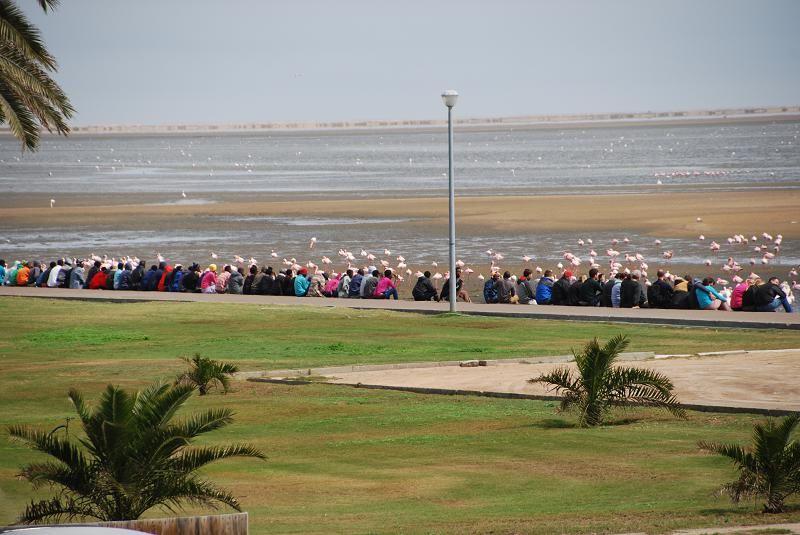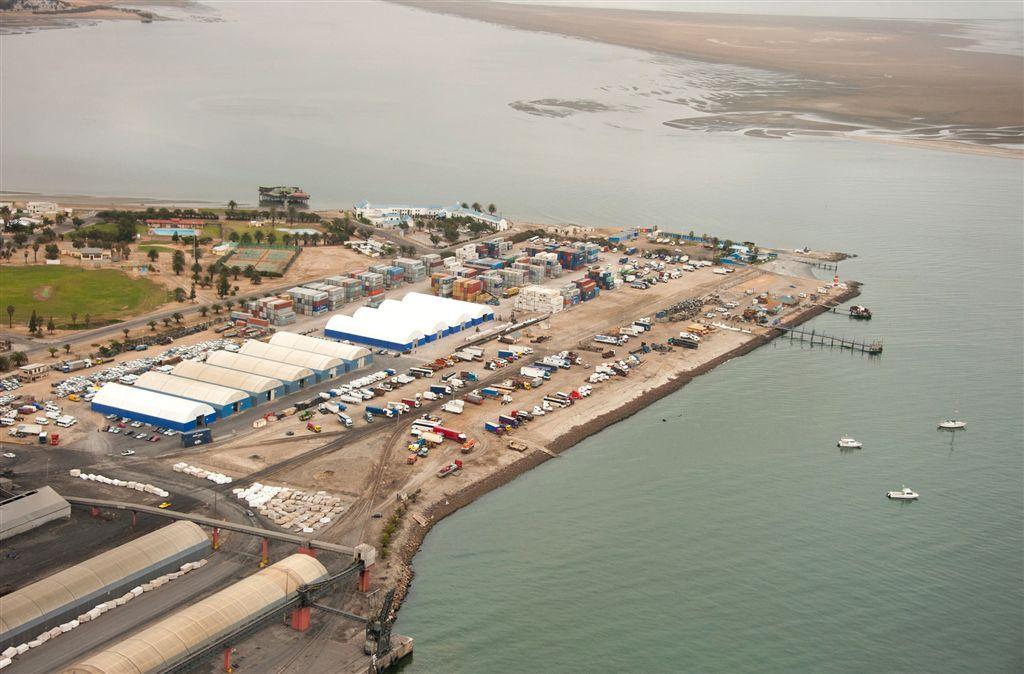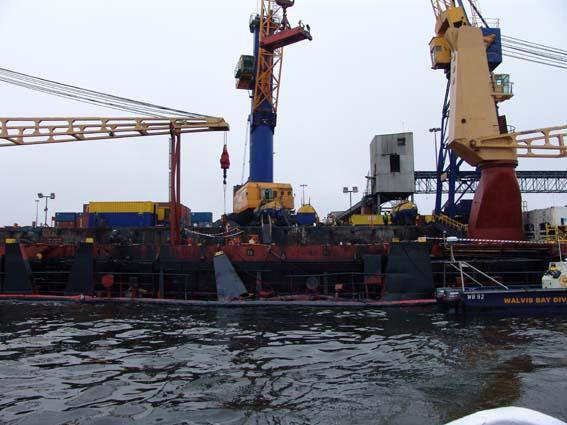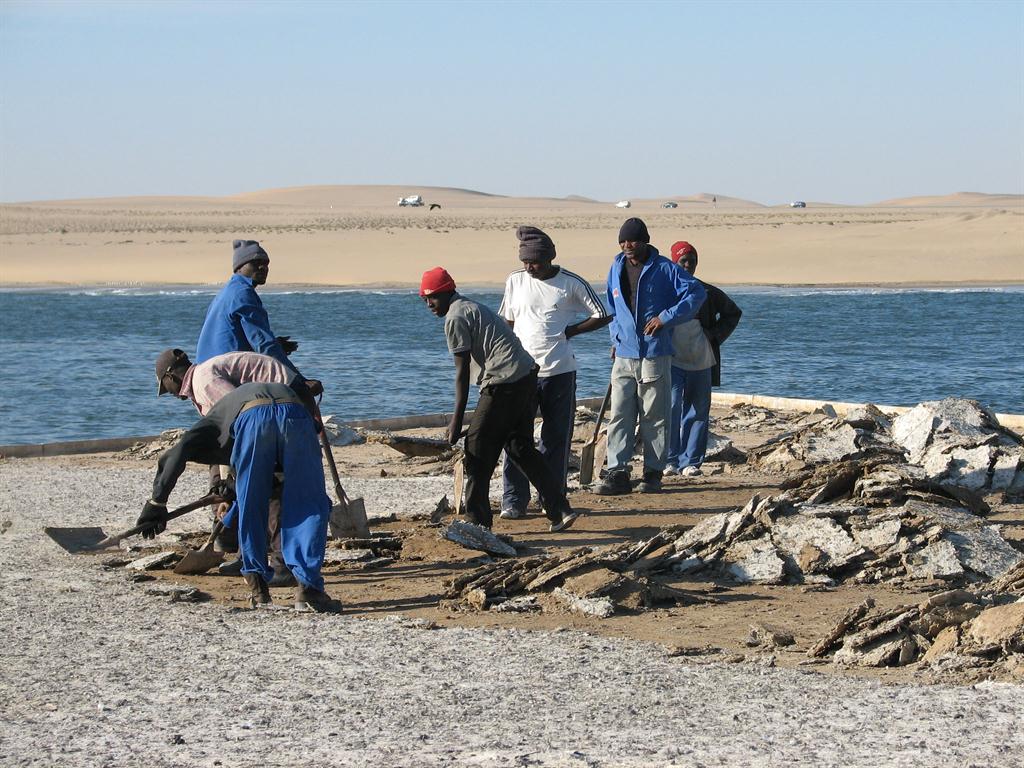Walvis Bay - aiming to set the standard
The name Walvis Bay is exactly what it seems to indicate: a concoction of the Afrikaans and English language - with Walvis being the Afrikaans word for a whale. And these whales were, what Walvis Bay was known for in the early days, when the warm waters of the lagoon encouraged the natural growth of plankton and marine life in the process attracting Southern Right Whales, which in turn drew whalers and fishing vessels.
The Portuguese navigator Diogo Cão reached Cape Cross, north of the bay, in 1485. Subsequently Bartolomeu Dias anchored his ship São Cristóvão in what is now Walvis Bay on 8 December 1487, during his quest to discover a sea route to the East.
Walvis Bay, despite being the main harbour of Namibia and thus serving the fishing industry, has over time developed into a well-liked tourism spot on account of its open spaces, scenic beauty and unique marine and plant life. It is well suited for the outdoor lifestyle, boasting sports such as sand-boarding, kiting, surfing, swimming, angling, sailing, golf and other indoor and outdoor sport codes. The yacht club with its facilities allows visitors to take part in water sport or for that matter join one of the various boat cruises and get to intimately know the bay area.
Walvis Bay is one of four finalists in the Namibia Media Holdings (NMH) Cleanest Town of the Year-competition and as a harbour town clearly has its work cut out. The municipality has therefore embarked on numerous cleaning campaigns.
According to David Uushona, manager of the solid waste and environmental management department, one of the first initiatives started, was the attention given to open and undeveloped erven, which had been abused as illegal dumping sites. “Many of these properties are privately-owned. To curb illegal dumping we wrote letters to the owners giving them a certain amount of time to clean up with the option of us - the municipality - taking care of the problem and charging the owners for cleaning up the areas concerned. This has brought improvement and we are now cleaning these erven every Friday.”
Uushona explained that since this cleaning effort required a lot of time, resources and organising, which resulted in the “Team Up To Clean Up” campaign. Kuisebmond was identified as the first suburb to be cleaned up in September 2017. The help of the navy, army, Namport, local citizens and schools as well as various ministries was called in, in an effort to kick-start the campaign. “This action was followed up with a cleaning operation in October the same year in Narraville. Early in 2018 we cleaned the town area and on 1 May 2018 we followed the call of President Hage Geingob and hosted another clean up in line with the National Clean-Up Campaign. It was a huge success, and after the May-Day Clean-up, we followed up with a car wreck removal exercise.” Late last year, the municipality had a pre-festive season clean-up campaign in order to clean the beach areas in Walvis Bay and up the coast to Long Beach in preparation of the festive season.
After the clean-up exercises, the municipality felt they needed political intervention according to Uushona: “In 2017 council resolved that every councillor will be allocated an area of responsibility and a theme, which the councillor was required to take ownership of. There is a councillor for parks and greenbelts, open spaces and access roads, sewer, trade areas, business premises, sand removal, construction and building rubble, car washes and raising of awareness-campaigns.”
Councillor Hilka Erastus, who is a teacher by profession, was tasked to raise awareness for cleanliness. “It is regarded as on-going exercise and it is expected that these councillors will assist staff in addressing these issues in order to keep our town clean”, says Uushona. He points out that the Walvis Bay landfill site is one of the few in the country that has a proper landfill management plan, and has been officially gazetted as a waste deposit site.
In 2017 council allocated an area to Rent-A-Drum to establish a material recovery facility. The town is in the process awarding a concession for waste power generators, which are fed with non-recyclable waste and thus generate energy - a first for Namibia.
The Otto Herrigel Environment Trust has engaged with council and they signed an agreement to regulate the use of plastic bags in Walvis Bay. Various shops are now charging N$1.00 for their plastic bags. “In collaboration with the Swakopmund Municipality we involved the schools in our campaigns and established a competition called “My Trash, My Treasure where schools had to come up with innovative ideas on how to turn waste into re-useable items.”
Aside from all these initiatives council also appointed three representatives serving on the Association of Local Authorities and who are part of a professional forum that deals with waste and environment. Furthermore three council members serve on the National Waste Management Strategy Advisory Panel of the ministry of environment and tourism.
According to Uushona the municipality is in talks to start with “an extra bin” campaign: “Currently numerous houses have additional shacks in their yards. More people will generate more waste and when the refuse bin is full, the surplus waste ends up in the street. Thus there needs to be an additional bin for each additional dwelling on the premises.”
He reiterated efforts to maintain a clean and healthy environment do not stop as council is busy drafting an Integrated Solid Waste Management Plan as well as a further Landfill Site Development Plan.
The Portuguese navigator Diogo Cão reached Cape Cross, north of the bay, in 1485. Subsequently Bartolomeu Dias anchored his ship São Cristóvão in what is now Walvis Bay on 8 December 1487, during his quest to discover a sea route to the East.
Walvis Bay, despite being the main harbour of Namibia and thus serving the fishing industry, has over time developed into a well-liked tourism spot on account of its open spaces, scenic beauty and unique marine and plant life. It is well suited for the outdoor lifestyle, boasting sports such as sand-boarding, kiting, surfing, swimming, angling, sailing, golf and other indoor and outdoor sport codes. The yacht club with its facilities allows visitors to take part in water sport or for that matter join one of the various boat cruises and get to intimately know the bay area.
Walvis Bay is one of four finalists in the Namibia Media Holdings (NMH) Cleanest Town of the Year-competition and as a harbour town clearly has its work cut out. The municipality has therefore embarked on numerous cleaning campaigns.
According to David Uushona, manager of the solid waste and environmental management department, one of the first initiatives started, was the attention given to open and undeveloped erven, which had been abused as illegal dumping sites. “Many of these properties are privately-owned. To curb illegal dumping we wrote letters to the owners giving them a certain amount of time to clean up with the option of us - the municipality - taking care of the problem and charging the owners for cleaning up the areas concerned. This has brought improvement and we are now cleaning these erven every Friday.”
Uushona explained that since this cleaning effort required a lot of time, resources and organising, which resulted in the “Team Up To Clean Up” campaign. Kuisebmond was identified as the first suburb to be cleaned up in September 2017. The help of the navy, army, Namport, local citizens and schools as well as various ministries was called in, in an effort to kick-start the campaign. “This action was followed up with a cleaning operation in October the same year in Narraville. Early in 2018 we cleaned the town area and on 1 May 2018 we followed the call of President Hage Geingob and hosted another clean up in line with the National Clean-Up Campaign. It was a huge success, and after the May-Day Clean-up, we followed up with a car wreck removal exercise.” Late last year, the municipality had a pre-festive season clean-up campaign in order to clean the beach areas in Walvis Bay and up the coast to Long Beach in preparation of the festive season.
After the clean-up exercises, the municipality felt they needed political intervention according to Uushona: “In 2017 council resolved that every councillor will be allocated an area of responsibility and a theme, which the councillor was required to take ownership of. There is a councillor for parks and greenbelts, open spaces and access roads, sewer, trade areas, business premises, sand removal, construction and building rubble, car washes and raising of awareness-campaigns.”
Councillor Hilka Erastus, who is a teacher by profession, was tasked to raise awareness for cleanliness. “It is regarded as on-going exercise and it is expected that these councillors will assist staff in addressing these issues in order to keep our town clean”, says Uushona. He points out that the Walvis Bay landfill site is one of the few in the country that has a proper landfill management plan, and has been officially gazetted as a waste deposit site.
In 2017 council allocated an area to Rent-A-Drum to establish a material recovery facility. The town is in the process awarding a concession for waste power generators, which are fed with non-recyclable waste and thus generate energy - a first for Namibia.
The Otto Herrigel Environment Trust has engaged with council and they signed an agreement to regulate the use of plastic bags in Walvis Bay. Various shops are now charging N$1.00 for their plastic bags. “In collaboration with the Swakopmund Municipality we involved the schools in our campaigns and established a competition called “My Trash, My Treasure where schools had to come up with innovative ideas on how to turn waste into re-useable items.”
Aside from all these initiatives council also appointed three representatives serving on the Association of Local Authorities and who are part of a professional forum that deals with waste and environment. Furthermore three council members serve on the National Waste Management Strategy Advisory Panel of the ministry of environment and tourism.
According to Uushona the municipality is in talks to start with “an extra bin” campaign: “Currently numerous houses have additional shacks in their yards. More people will generate more waste and when the refuse bin is full, the surplus waste ends up in the street. Thus there needs to be an additional bin for each additional dwelling on the premises.”
He reiterated efforts to maintain a clean and healthy environment do not stop as council is busy drafting an Integrated Solid Waste Management Plan as well as a further Landfill Site Development Plan.








Kommentar
Allgemeine Zeitung
Zu diesem Artikel wurden keine Kommentare hinterlassen